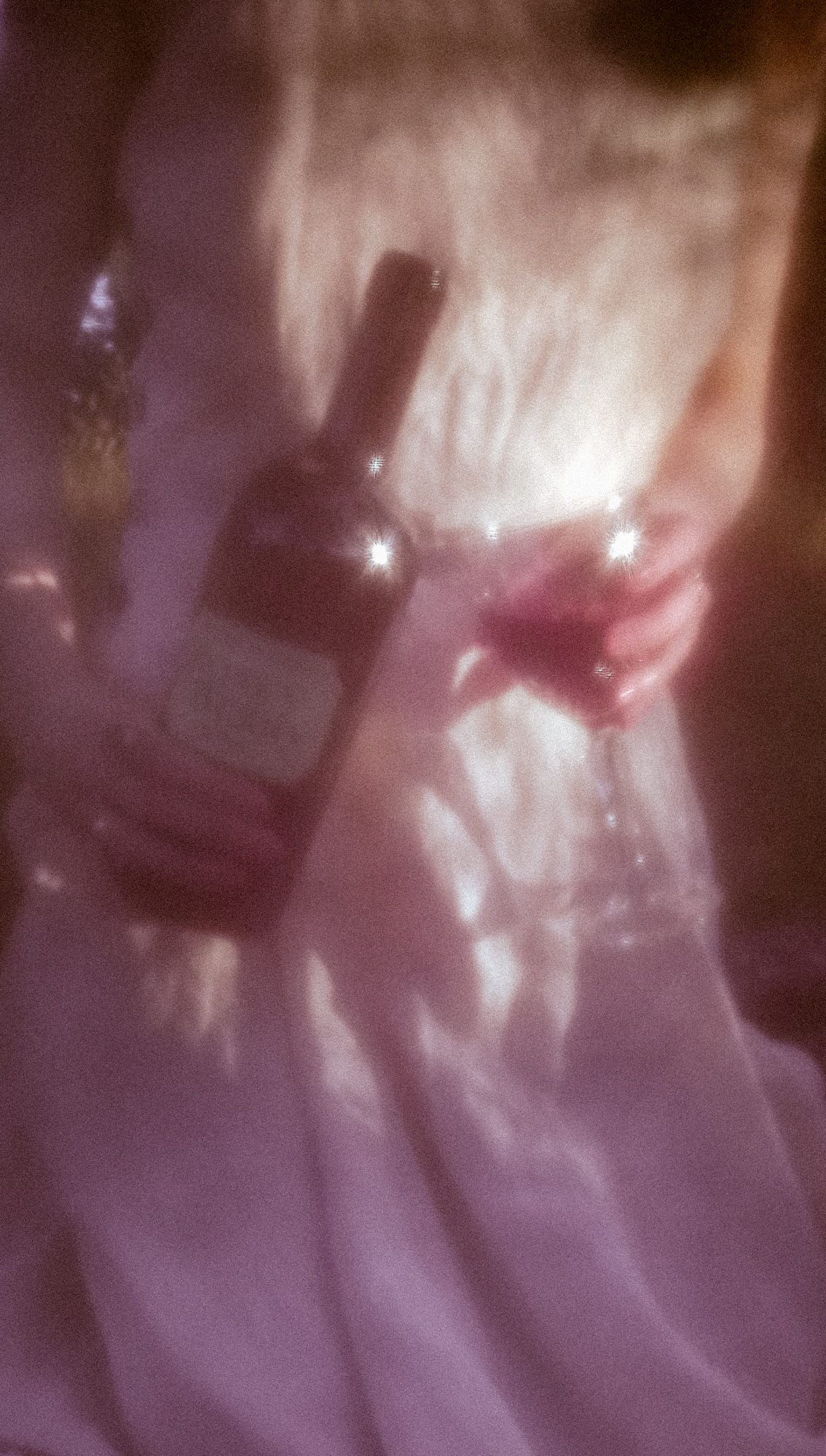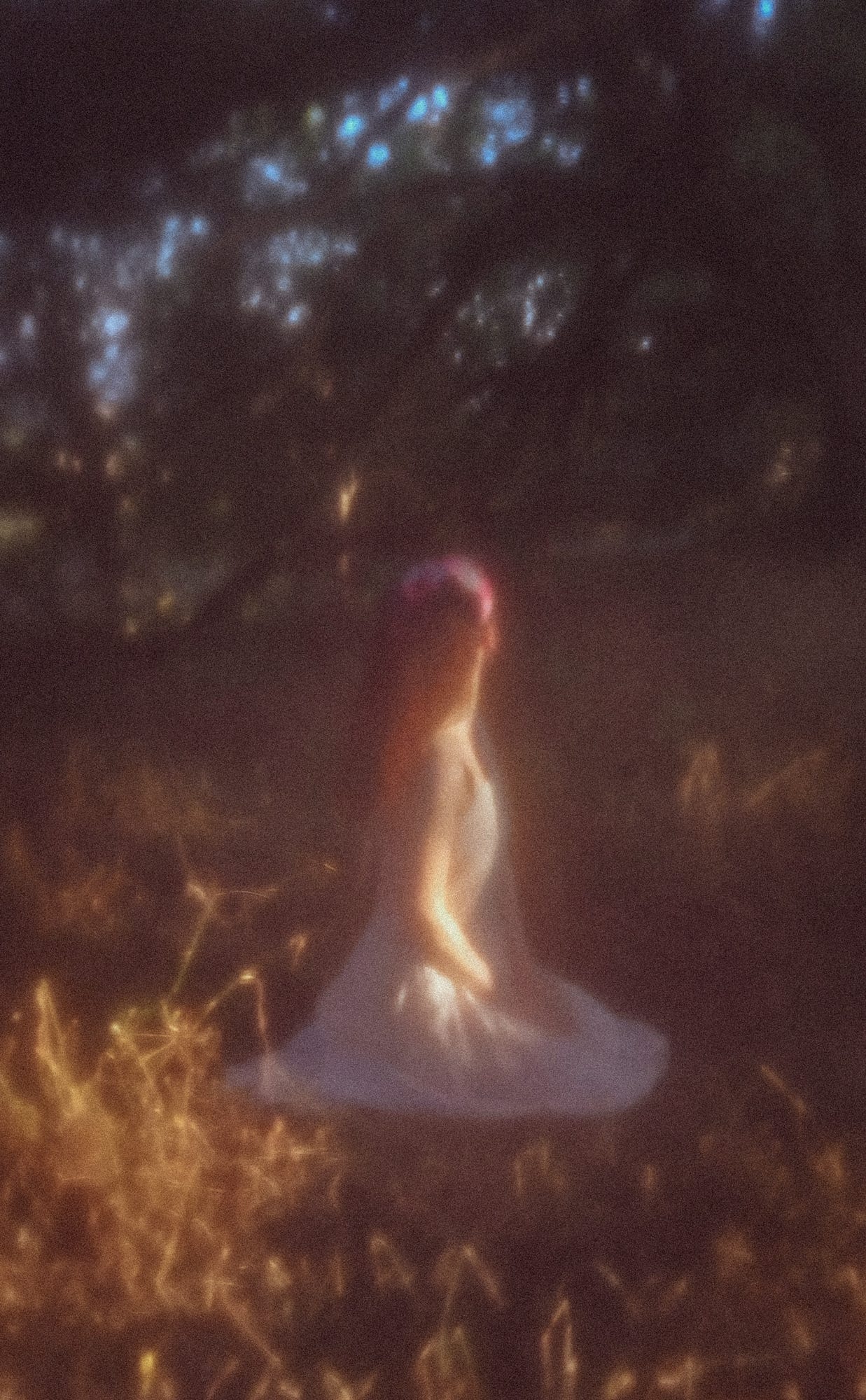How to find your creative spark (when life feels overwhelming)
The creative spark never truly dies. Here's ways to nurture and encourage creativity at your lowest ebb
A young woman, attired in a headscarf and linen dress, races along the woodland path. She scans the nearby trees, seeking a familiar trunk or knot. A cool breeze dances through the summer haze. The barley in the nearby field still bears a touch of green, and yet rowan berries peek through the dark thicket of leaves in a fiery flash of autumn.
Caorann. The Gaelic name for rowan appears on her tongue, bright and sharp as the berries themselves. Every autumn its crimson bounty reminds her of the fruitfulness that follows a languid summer.
She swerves off the path and into the leafy shade of an oak. She’s certain she lost it here. The woman twirls a few circles in the wispy grass. Doubles back. She can’t have set it down for more than ten minutes. Maybe a mischievous fairy of the hilltop wood has made off with it? She wanders deeper into the overgrowth, where cuckoo spit froths on the swaying grass stems. She frowns. Maybe she didn’t look properly and it was in her bag after all? It wouldn’t be the first time…
She stops for a moment to savour the stillness of the late summer evening. In a few short weeks it will be too dark to come this way. The fireweed will have shriveled and the bright, lilac towers of foxglove will bow to unruly bramble thickets and wizened hogweed.
Her gaze drifts down, and she spots what she’s looking for: a burgundy-bound book of Tennyson poetry. “There you are!” She bounds towards it and scoops the book from the grass. She’s fond of ‘Idylls of the King’ but the real reason she brings Tennyson along with her on these expeditions is that it belonged to her Grandad. The antique book has become a sort of charm, a piece of the past that protects her from the bewildering briskness of daily life.
Clutching the poems in one hand, skirts in the other, she races back through the wood to find her sister, who is spreading a picnic blanket at the edge of the path, replete with fragrant strawberries, buttered bread, and cheese. Her sister hands her a bottle of honeyberry wine to uncork. The soft pop and clink of crystal glasses symbolise a farewell to summer, but also a creative endeavour that came to fruition, and a lost book found.
The year is 2022. The woman splashing ruby-red wine into a glass is me and the one capturing the moment is my sister.
4 months ago I couldn’t imagine that this would be me - larking around the woods in a linen dress and taking pictures for the sake of creative play. The thought of making my imagination a reality used to send bubbles of excitement fizzing in my chest like champagne.
But after life blindsided me with two big changes, the bubbles went flat.
I think it’s normal for life’s challenges to dull our sparkle. If you’re a creative person it can feel disconcerting not only to be unable to create, but to not want to create.
It feels like an essential part of yourself has walked away, and you worry whether it will ever come back.
But it does come back. It comes back because creation is a natural part of human life. However, reigniting creative passion isn’t a process we can force or hurry along.
Thankfully, I feel my own creative spark reawakening. The initial shock has passed and I feel curious about the road ahead instead of anxious. In fact, I firmly believe that both life changes are for the best.
I thought I’d share the things that helped me relight my creative spark in the hope that it comforts anyone who feels like life has smothered their artistic fire.
Rest. I can’t overstate the importance of this step. If you’re struggling with loss, grief, illness, or any significant life change, your first priority is to feel safe and well again. Focus on getting plenty of sleep, hydration, and nutritious meals. Take long walks in nature and, if possible, try not to create. I’d also caution against late-night phone scrolling. You’ll inevitably compare yourself to other creators and feel bad that your rate of output isn’t the same, which in my case only leads to staring at the ceiling until 3am. Instead, read a few pages of a book or magazine and try to get an early night. I love the phrase, “you can’t pour from an empty cup” and it’s true. Trust that your creative spark will return if you only follow this one step.
Play. There’s a time and place for discipline in the creative process but this isn’t it. When your spark has fizzled out you need to nurture it into being. Giving yourself permission to play awakens a childlike curiosity. You’re more open to trying something new when your mind isn’t rebelling against expectations and deadlines. For example, in my last post, I mentioned taking pictures with a pair of tights stretched across the lens. I had no idea how the shots would turn out, but creating a picture-perfect image that garnered thousands of likes wasn’t the point. It was a whimsical experiment, and the freedom of creating purely to satisfy my own curiosity sparked a chain of ideas that I feel excited to try.
Seek inspiration offline. Art and what’s popular online might be two different things. And it’s highly likely that what’s popular and the art you enjoy creating are two different things. I personally found that seeking inspiration in books, music, and film helped nudge my creative spirit awake. For a while now I’ve been throwing myself into my high school music taste, which not only helped me finish my novella but re-established a broken connection to my old self. Ask yourself if you have any interests that you abandoned because they made you cringe or feel like an outsider. I promise that none of these interests are lame or unworthy. They are a part of who you are, and it’s only once we accept and embrace every part of ourselves that we can create without inhibitions.
You already have everything you need. A creative block I had to work through recently was the feeling that I needed the best camera in order to take photos. Or that to try vlogging I needed an iphone. Or that I needed to mind-swap with someone much cooler and more intelligent than me to be a great writer. The truth is, I already have all I need. Often great art is made from a meeting of necessity and ingenuity. I believe that we all require creative outlets and that you don’t need expensive equipment to do it. Trust that your unique perspective, experiences, and the tools at hand are enough - then see what happens!
One project at a time. If life feels overwhelming then a deluge of multiple creative projects is only going to extinguish your spark. My creative lull struck at the same time I was due to work on Fireside Magic with my editor. I knew I had to let go of something to conserve my fragile creative energy, and that something had to be Instagram. For a while now Instagram has had me on the short lead, creating posts to feed the algorithm instead of art to nourish myself, but that’s another post for another day. Suffice to say I felt more creatively aligned and energised when I focussed on the one thing I’ve always loved: writing stories.
Trust. I feel this word has cropped up a lot in today’s letter but trusting the process and yourself is really what gets you through. And I think that trust comes easier when you fully embrace part one - rest. Think about the boss who never cuts you any slack, the line manager who micro-manages every second of your workday, or the co-worker who guilt trips you for taking breaks. Do you trust any of them to have your best interests at heart? Probably not. Similarly, it’s hard to trust yourself after frequent mental floggings! Allow yourself guilt-free rest and judgement-free play and soon you’ll be able to trust that you can give yourself what you need in order to heal and create.
If these tips found you in a moment of struggle, then I hope they helped. Please know that your creative spark never truly dies, it simply needs rest and gentle coaxing to life.
Kate xx






I love all of these tips! I really struggled with my writing after I sent my novel for a developmental edit a couple of years ago and ended up having to rewrite the entire book. It seemed everything I thought I did well was specifically called out in my edit letter as something to work on. It was ROUGH.
I've never really thought of myself as a particularly imaginative person, so all my struggles to reconstruct the plot just fed into that and I gave up on my novel for months. I couldn't read in my genre, either, could barely read at all because everything I read just seemed to remind me of my own failings (if this sounds melodramatic, believe me, I know! But that's really how I felt for months).
What ultimately helped me the most was taking up sewing, for a few reasons. One, it's a creative outlet that is solely for myself, so it's low pressure. It doesn't have to be *good*, because honestly as soon as you tell someone "I made it myself!" they don't care if your hem is wobbly or your pleats are uneven, they just think it's cool you made your own skirt.
More importantly, though, sewing reminded me of my own creativity. I didn't think of sewing as a creative endeavour when I started -- I was just cutting out and assembling other people's patterns, right? -- but I very soon realised that most of my projects were self-drafted or heavily modified patterns because I couldn't find a pattern that exactly matched what I had in my head. They're simple patterns, because I'm still a newbie, but I really couldn't escape the fact that making up my own patterns is an act of creativity.
And sewing gave me the space in my day to daydream about my stories in a way I hadn't in months, because I was doing something with my hands that didn't fully occupy my brain, and so my mind wandered and made connections in my story as I worked.
That book is now in line edits, a most terrifying and thrilling process.
This turned out way longer than I thought it would, but the short version is that sometimes to trust your creativity, you have to trick yourself into thinking your new, low-stakes hobby isn't creative, until suddenly you realise that you're daydreaming about your story 😛
This is beautiful Kate. Thank you so much for sharing. Your words mirror much of the feelings I had coming out of a creative slump. A phrase I’ve been holding close lately is “follow the joy” as a guide for where I want to spend my creative energy. It’s been very freeing and a good check in for when I feel lost or swayed by comparisonitis.